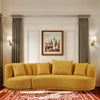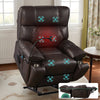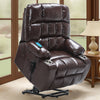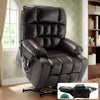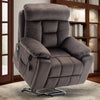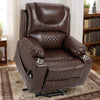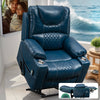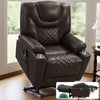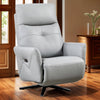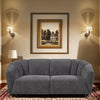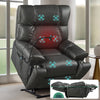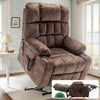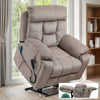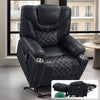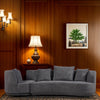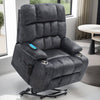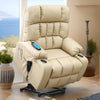Understanding the Needs of the Elderly
The Importance of Comfort and Ergonomics
Comfort is key for elderly individuals. A good recliner should offer proper support for the back and joints. It should have a soft, yet firm cushion that doesn't sink too much. The chair's design should promote good posture. Ergonomics play a vital role in preventing pain and discomfort. Look for recliners with adjustable headrests and lumbar support. These features can help reduce strain on the neck and lower back. Remember, a comfortable recliner can improve an elderly person's quality of life.

Addressing Mobility and Accessibility Concerns
Mobility issues are common among the elderly. A recliner should be easy to get in and out of. Look for chairs with a lift mechanism. This feature helps seniors stand up without straining. Wide armrests provide extra support when sitting down or standing up. The recliner should have smooth, easy-to-use controls. Large buttons or a simple remote can make adjusting the chair easier. Consider the space around the recliner too. Ensure there's enough room for a walker or wheelchair if needed.
Emphasizing Functionality and Aesthetics
A recliner should be both functional and attractive. It should fit well with the existing decor. Dark blue recliners are a popular choice. They look stylish and hide stains well. The chair should have useful features like side pockets for storage. Cup holders can be handy for keeping drinks close by. Some recliners come with USB ports for charging devices. Consider the fabric too. It should be soft, durable, and easy to clean. A recliner that looks good can boost an elderly person's mood and comfort at home.
Key Features to Look for in a Recliner for Elderly Use
Selecting the Right Size and Type of Recliner
Size matters when choosing a recliner for the elderly. The chair should fit the user's body well. It shouldn't be too big or too small. Measure the person's height and weight before buying. There are different types of recliners to consider:

- Manual recliners: These are operated by a lever or handle.
- Power recliners: These use a motor for easier adjustment.
- Wall-hugger recliners: These need less space and are good for small rooms.
- Lift recliners: These help seniors stand up easily.
Choose a type that best suits the elderly person's needs and abilities.
Evaluating the Durability and Quality of Materials
A good recliner should last for years. Look for chairs made with sturdy materials. The frame should be made of hardwood or metal. Check the quality of the upholstery. Leather is durable but can be cold. Microfiber is soft and easy to clean. The cushions should be firm enough to provide support. They shouldn't flatten out quickly. Pay attention to the reclining mechanism. It should operate smoothly without squeaks or jerks. A warranty is a good sign of quality. It shows the manufacturer stands behind their product.
Highlighting User-Friendly Features and Design
User-friendly features make a big difference for elderly users. Look for recliners with:
- Easy-to-reach controls
- Smooth reclining action
- Wide, stable base
- Non-slip upholstery
- Heat and massage options
- Adjustable headrest and footrest
The design should be simple and intuitive. Avoid complicated mechanisms that might confuse or frustrate seniors. A dark blue recliner chair can be a good choice. It's stylish and hides stains well. Make sure all parts of the chair are safe. There should be no sharp edges or pinch points. The recliner should feel stable in all positions.
The Best Recliners on the Market for Elderly Individuals
Top Picks for Comfort and Accessibility
Several recliners stand out for elderly use. Here are some top picks:

- The Comfort King: Offers excellent lumbar support and a soft, plush cushion.
- EasyRise Lift Chair: Features a smooth lift mechanism for easy standing.
- Cozy Dreamer: Includes heat and massage functions for extra comfort.
- SleekStyle Wallhugger: Perfect for small spaces, with a stylish dark blue option.
- GrandComfort XL: Designed for larger individuals, with extra-wide seating.
These chairs excel in comfort and ease of use. They have features that cater to elderly needs. Each offers a blend of support, accessibility, and comfort. Consider trying out these models if possible before making a decision.
Reviewing the Cost-Benefit Analysis of Various Brands
When choosing a recliner, consider both cost and value. Higher-priced models often offer more features. But they may not always be necessary. Here's a quick breakdown:
- Budget-friendly options ($300-$600): Basic features, manual operation.
- Mid-range recliners ($600-$1000): Power recline, better materials.
- High-end models ($1000+): Advanced features, top-quality construction.
Consider how often the chair will be used. A more expensive model might be worth it for daily use. Look for sales or discounts to get better value. Some brands offer good warranties, which can save money long-term. Remember, the cheapest option isn't always the most cost-effective. Balance price with quality and features needed.
The Impact of Customer Satisfaction on Recliner Selection
Customer reviews can be very helpful when choosing a recliner. Look for feedback from other elderly users or their caregivers. Pay attention to comments about comfort, ease of use, and durability. Positive reviews often mention:
- Long-lasting comfort
- Easy-to-use controls
- Good customer service
- Sturdy construction
Negative reviews might flag issues with:
- Difficult assembly
- Malfunctioning parts
- Poor cushion quality
Remember, everyone's needs are different. What works for one person may not suit another. Use reviews as a guide, but also consider personal preferences. If possible, try the recliner in person before buying. This can give you a better feel for its comfort and features. Don't forget to check the return policy, just in case the recliner doesn't meet expectations.







